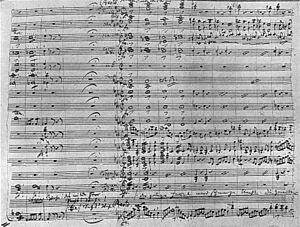Orchestration facts for kids

Orchestration in music means two main things. First, it is the study of how to write music for an orchestra. This includes knowing how each instrument sounds and how they work together. Second, orchestration can also mean the list of instruments used in a specific piece of music.
Contents
What is Orchestration?
Orchestration is all about understanding how to write well for different instruments. It teaches composers how to combine instruments so they sound good together. It also helps balance the sounds of many instruments.
Learning Orchestration
People who want to compose music for orchestras need to study orchestration. They can learn by reading special books about it. It also helps to study musical scores written for orchestras. Listening to orchestras play in concerts or on CDs is another great way to learn. Music students often practice orchestration by taking piano music and changing it for an orchestra. This is called arranging.
Orchestration vs. Instrumentation
The word instrumentation is very similar to orchestration. Instrumentation means understanding each instrument. It's about knowing all the different sounds an instrument can make. Instrumentation can be about any music with instruments. Orchestration, however, usually refers specifically to the orchestra. It covers how orchestras have been used from the 17th century until today.
Composers and Orchestration
Sometimes, composers write the main melodies and harmonies but let other people do the orchestration. For example, Leonard Bernstein composed West Side Story. But he had other people arrange his music for the orchestra.
A famous example of re-orchestration is Maurice Ravel's work. He took a piano piece called Pictures at an Exhibition by Modest Mussorgsky. Mussorgsky had died many years before. Ravel then arranged it for a full orchestra. Most people today know Ravel's orchestral version, not Mussorgsky's original piano piece.
Famous Orchestrators
Some composers were especially good at writing for orchestras. Hector Berlioz and Nikolai Rimsky-Korsakov are two famous examples. They both wrote books about orchestration. These books are still very helpful for students and composers today.
See also
 In Spanish: Orquestación para niños
In Spanish: Orquestación para niños
 | May Edward Chinn |
 | Rebecca Cole |
 | Alexa Canady |
 | Dorothy Lavinia Brown |

